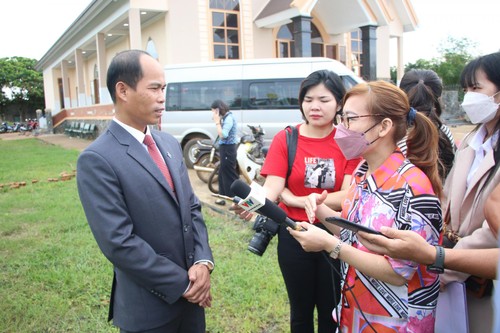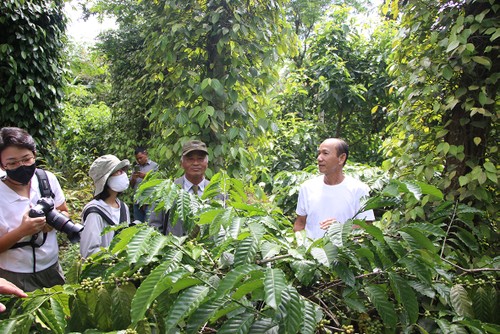 Pastor Ai Krol of the Ea Hiu Chapter of the Evangelical Church is interviewed by reporters. Photo: baodaklak.vn Pastor Ai Krol of the Ea Hiu Chapter of the Evangelical Church is interviewed by reporters. Photo: baodaklak.vn
|
Dak Lak currently has more than 615,000 religious followers, accounting for more than 30% of the provincial population. Its four major religions are Catholicism, Buddhism, Protestantism, and Caodaism. There are 356 official religious establishments and nearly 1,400 working dignitaries and monks. From the beginning of 2021 to June 2022, the province registered 13 eligible Protestant practice venues, bringing the total number of registered Protestant venues to 220.
In Ea Kar district, in the east of Dak Lak, there are 23,000 religious followers, accounting for 15.5% of the district’s population. 24 dignitaries are in charge of 11 grassroots religious organizations. Vice Chairman of the District People’s Committee Nguyen Minh Truyen said the local administration cares about religion.
“We create conditions for religious establishments to operate and instruct on land procedures for construction permits for worship facilities. Every year, on big occasions, the authority congratulates dignitaries, listens to the thoughts and aspirations of believers, and strengthens the harmonious relationship between the local administration and religions,” he added.
Dignitaries said their religious freedom is protected. Pastor Ai Krol of the Ea Hiu Chapter of the Evangelical Church, said: “The administration has created favorable conditions for our activities. Everything is fine, no problem. Several years ago, we performed rituals and prayers in a makeshift church. Now, authorities facilitated a beautiful and spacious church. Since worshiping in a church like this, everyone is excited.”
 The reporters put questions to Mr. Y Pup Knul (right), Ea Kar Evangelical Association (Ea Kar district) as his household has done good business. Photo: baodaklak.vn The reporters put questions to Mr. Y Pup Knul (right), Ea Kar Evangelical Association (Ea Kar district) as his household has done good business. Photo: baodaklak.vn
|
Religious followers in difficult circumstances are supported by the government with housing, capital, and cows to maintain their livelihoods. Ai Kien, pastor of Buon Giap Church under the Vietnam Missionary and Christian Association, told us: “I think the local authority here is good because they help people a lot like with the housing program 134 and program 176. They help poor households raise goats and cows.”
Dinh Thi Binh, a Tay ethnic woman from M'O village, said:“The administration cares about the lives of believers. For example, helping us with jobs and building houses. Although our worship establishment has not yet been officially licensed, the local administration creates favorable conditions for people to practice their religion, so we are very happy and grateful for the care.”
Kitanawa Katz, a reporter for Japan’s JiJi Press, has discovered more about human rights guidelines, policies, and concerns of the local government and the Party and State of Vietnam.
“While visiting churches here, I saw women and children singing hymns happily. In Japan, I rarely go to church, but when I come here, I find the atmosphere in Vietnamese churches joyous, the space is bright. I see no pressure on people's religious life at all,” he said.
South Korean female reporter Jung Rina told VOV: “Vietnam is a country with multiple ethnic groups and diverse cultures. When I visited the Central Highlands, I saw the real life of ethnic minorities, exchanged with local people and leaders, and gained more knowledge, experience and understanding of the region. The field trip helped me and other foreign reporters get an honest view of the freedom of religious activities of the Central Highlanders and of the Vietnamese people. I am very impressed with that.”
The reality of Dak Lak province gives evidence that the Vietnamese Party and State stance on protecting people's right to freedom of belief and religion is being delivered clearly and effectively.